Product manager Luke Shipway discusses eco-friendly credentials in our kitchen product portfolio as we back environmental Sustainability Week
At Caple, we know that our planet is precious. So we take environmental sustainability seriously. And we realise that we all have a role to play in terms of conserving natural resources and protecting global ecosystems. After all, the choices we make today affect the future we experience tomorrow. While there are many
different definitions of environmental sustainability, certain key themes endure. In simple terms, it’s all about responsible interaction to avoid depletion or degradation of our natural resources. And that includes buying sustainably. Put simply, the appliances you choose, for example, can have a huge impact on the environment.

Last week (22nd March) marks The Economist’s Sustainability Week where actionable insights and practical solutions will be provided to help businesses address this initiaitive. The online website offers insight and opinion on international news, politics, business, finance, science and technology So, in light of this, we asked product manager Luke Shipway to investigate some of the eco-friendly credentials in our kitchen product portfolio.
Induction Hobs
Longevity and carbon emissions are two key criteria to consider in the pursuit of environmental sustainability. At Caple, we make sure our appliances are built to last. Importantly, they are also designed in-house in the UK, which helps to keep our carbon footprint low. Our aim is to combine high performance and excellent efficiency with low energy consumption.
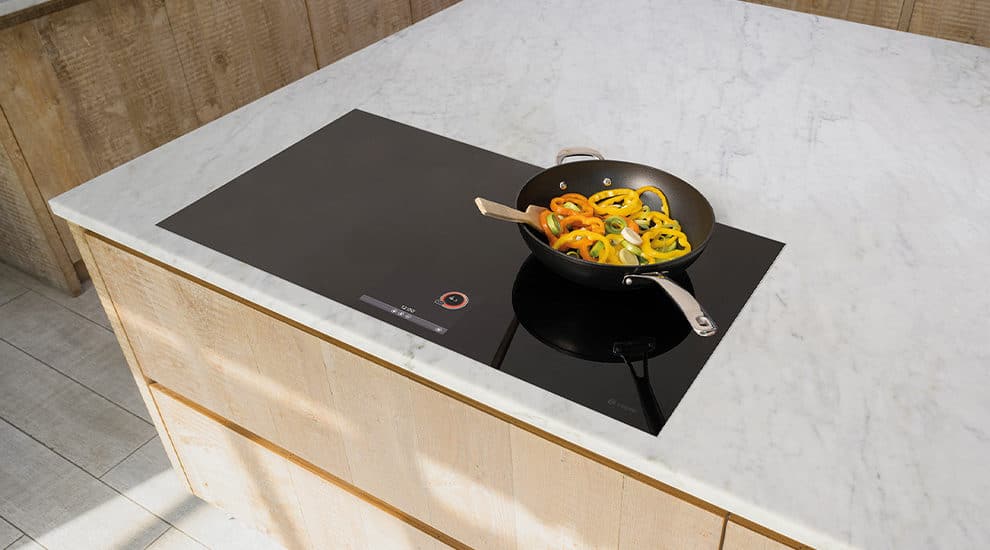
Induction cooking is a wonderful way to foster environmental sustainability. It heats food faster with more control because induction hobs use electromagnetic energy to directly warm pots and pans. Gas and electric cooktops, on the other hand, heat indirectly via burners or heating elements. So, Induction cooking is precise, and achieves a wide
range of temperatures, with no wasted heat. That’s because 100% of the energy goes straight into the base of your pan. Whereas with other hobs, a large percentage of heat escapes into the ambient air. So switching to induction cooking can obviously lead to excellent energy savings. It’s safer, and easy to keep clean with a smooth glass surface, too!
Our C990i induction hob features intuitive Caple Smart pan detection. This will automatically detect the location of your pan and its size. It also includes an auto-bridge function for larger pans, plus a handy ‘keep warm’ setting.
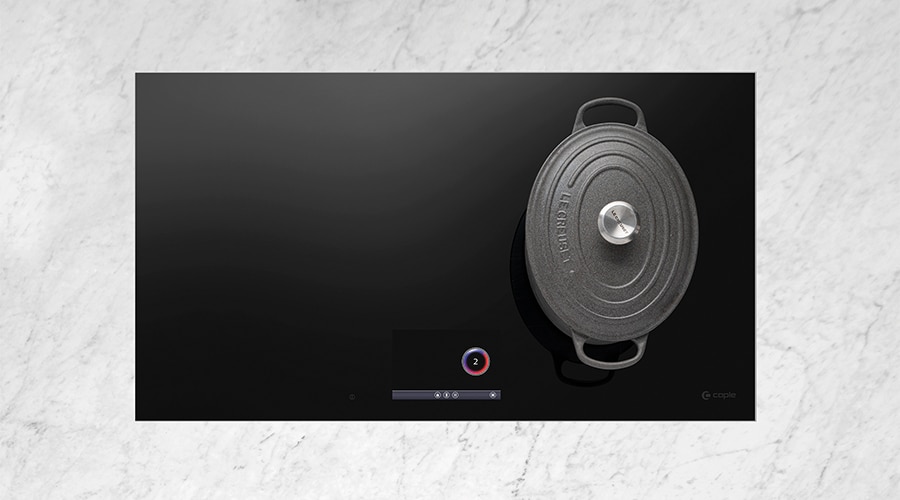
Keeping your cool– quite literally – is hugely important in the pursuit of environmental sustainability. After all, your fridge-freezer is the only kitchen appliance that’s switched on 24/7! So energy efficiency really is paramount.
Refrigeration

There are all sorts of things to consider when buying a new model, including capacity and independent temperature zones. Features such as super freeze and super cool are also important. This will enable your food shopping to reach the optimal temperature quickly. Frost-free technology doesn’t just mean you don’t have to bother manually defrosting your freezer, saving you time and energy.
It also prevents ice build-up, so there’s plenty of room for food storage. In addition, it helps to prevent your edibles suffering from ‘freezer burn’, thereby minimising waste. Lastly, frost-free technology actually makes your appliance more efficient. A freezer full of frost has to work much harder to stay cold, which in turns uses more electricity – and costs you more money.
If environmental sustainability is a priority, it’s worth taking some time to choose the right washing machine and tumble dryer. These are some of the most heavily used appliances in your kitchen, so energy-efficient models can make a real difference to your consumption.
Laundry
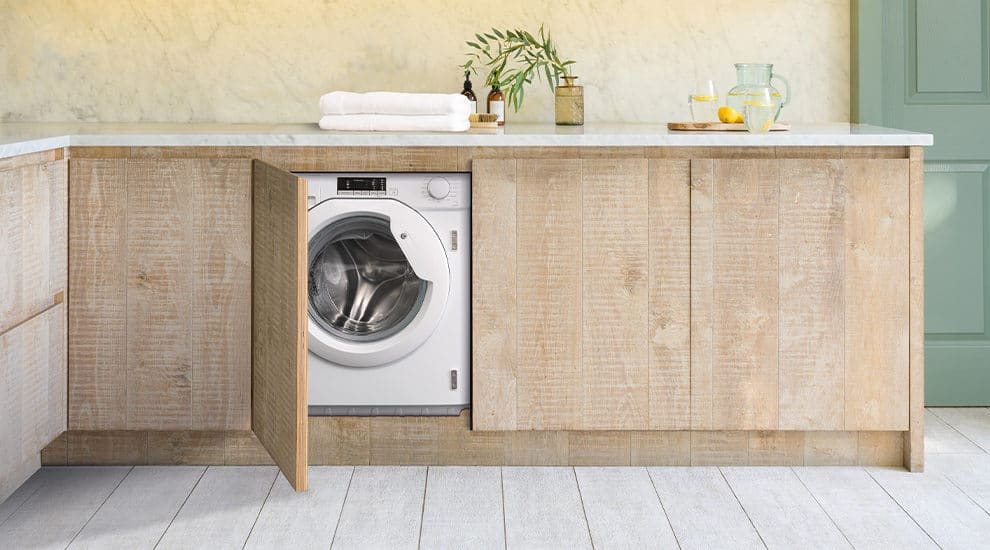
The ability to wash effectively at lower temperatures – and special eco programmes that use significantly less water – are key functions to look out for. A large tub capacity will also allow you to use fewer loads to clean the same amount of laundry. Look out for a good maximum spinning speed – 1400rpm should remove more water so your clothes will dry more quickly too.
Our WMi4000 fully integrated washing machine has an impressive energy rating, plus an extra roomy 9kg capacity. It offers a wide variety of programmes, including a 14min Rapid Wash.
In the past, tumble dryers may have had rather a poor reputation where energy consumption was concerned. Modern models, however, are more eco-friendly and efficient. They’re also an ultra-practical solution to drying clothes in a country where winter sometimes seems to last nine months of the year! I suggest you look out for heat pump tumble dryers if environmental sustainability is important to you. These recycle the hot air that’s created inside the drum, to dry your clothes, which makes them more efficient in comparison with condenser or vented versions.
Sensor drying is also a revolutionary eco-friendly method, which will adjust the programme time according to the humidity/moisture of the clothes in the drum. This makes the appliance extremely energy efficient as it uses 50% of the energy you would expect to be used in a conventional tumble dryer.
Our advanced TDI4000 tumble dryer combines a heat pump with sensor drying, which monitors the humidity/moisture within the laundry in the drum.
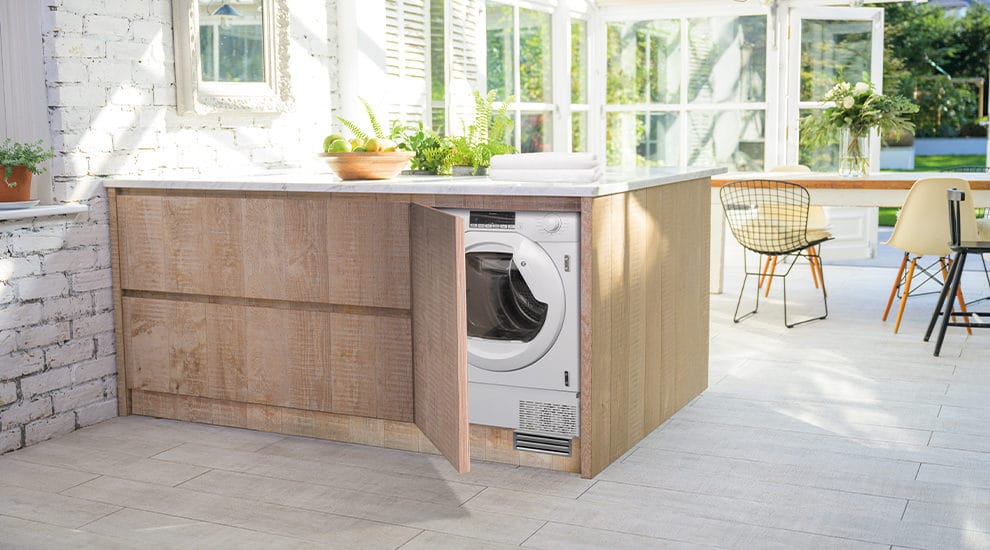
Dishwashers
Studies have shown that dishwashers are more energy-efficient than washing dishes by hand. That’s the good news! The bad news is that not all dishwashers are created equal. So, to maximise environmental sustainability, choose a model that offers energy-save
functions and a self-cleaning programme. Delayed timers are also useful. These allow you to set your appliance to automatically start at a certain time. Certain energy suppliers charge less during off-peak hours, so running your dishwasher in the evening could save you money.
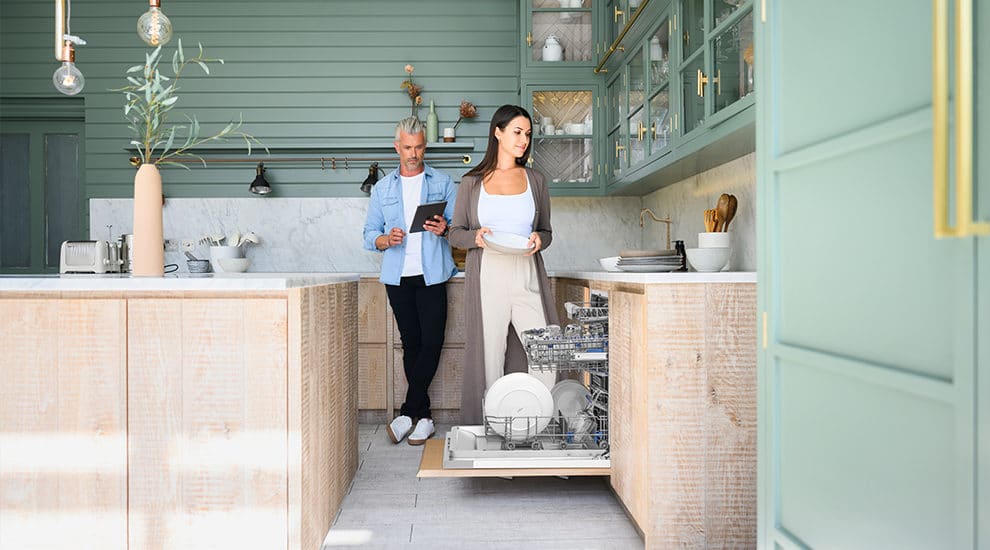
Our Di653 fully integrated dishwasher features a 360° water spray arm for exceptional cleaning. Its functions include a power wash for heavily soiled crockery, an express programme, and an energy-save option for partial loads.
Steaming Water Taps
Sometimes changing little things can make a big difference. It might only be a small appliance, but your kettle uses a lot of water and electricity. In 2013, an Energy Saving Trust report suggested that overfilling kettles wasted a staggering £68m a year. So swapping yours for a steaming water tap could save you a significant amount of time, energy and money.
Kettles waste water, because we overfill them, reboil them – and often pour leftover water down the sink! Steaming water taps are far more efficient, on almost every level. To start with, the water is held in an insulated tank, which helps to reduce heat loss. And of course, you use only the exact amount of water you need, whether that’s for making tea or cooking rice and pasta.
Time for a brew? Our Vapos 2 3in1 model can make up to 100 cups an hour! It provides instant cold water, hot water and filtered 98°C steaming water –all from one single, stylish tap.
We should all aware of the perils of too much plastic. Yet the demand for filtered water continues to increase. Want to find a solution? Enter the filtered water tap. These remove impurities and chlorine, which improves the water flavour. Their inbuilt scale inhibitor can
also help to reduce the build-up of limescale, prolonging the life of your kitchen appliances. Crucially, installing a filtered water tap reduces the need to buy water in plastic bottles. So, that’s good news for environmental sustainability – and it’s kinder on your pocket.
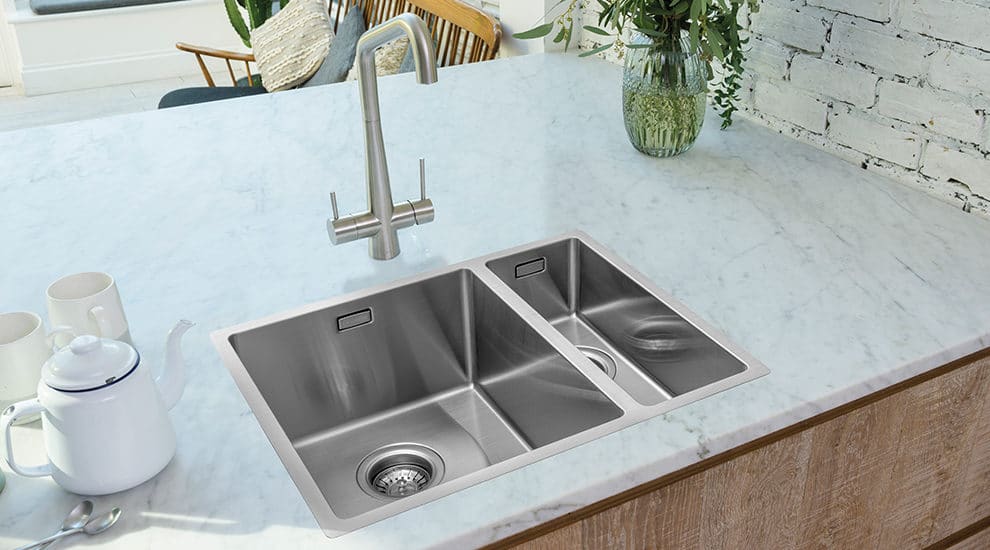
Did you know that the filter for our Harlo Puriti tap can produce 6,000 litres of water? Buying that amount in bottles could cost you around £4,000! It would also translate into around 3,000 unnecessary plastic containers – and a huge amount of harmful plastic pollution.
Click below to learn more about energy labels and recent regulation changes.